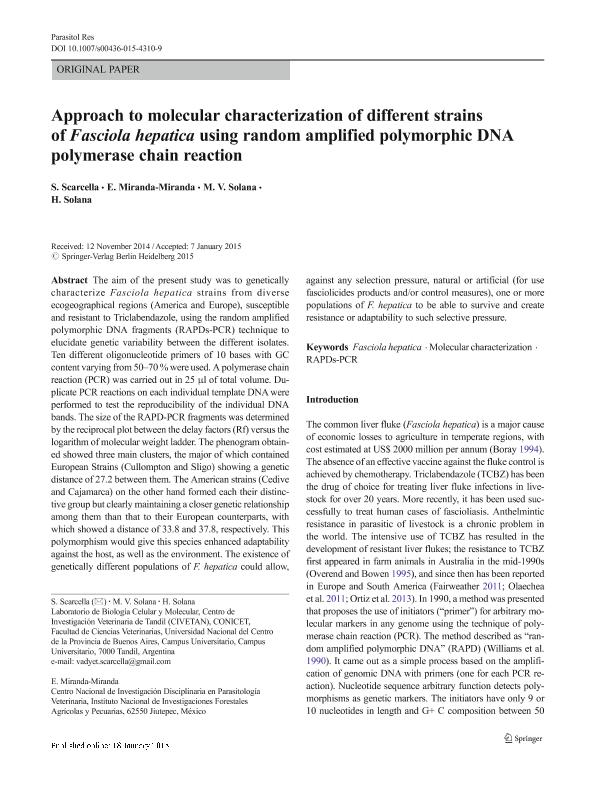Artículo
Approach to molecular characterization of different strains of Fasciola hepatica using random amplified polymorphic DNA polymerase chain reaction
Fecha de publicación:
03/2015
Editorial:
Springer
Revista:
Parasitology Research
ISSN:
0932-0113
Idioma:
Inglés
Tipo de recurso:
Artículo publicado
Clasificación temática:
Resumen
The aim of the present study was to genetically characterize Fasciola hepatica strains from diverse ecogeographical regions (America and Europe), susceptible and resistant to Triclabendazole, using the random amplified polymorphic DNA fragments (RAPDs-PCR) technique to elucidate genetic variability between the different isolates. Ten different oligonucleotide primers of 10 bases with GC content varying from 50–70 % were used. A polymerase chain reaction (PCR) was carried out in 25 μl of total volume. Duplicate PCR reactions on each individual template DNA were performed to test the reproducibility of the individual DNA bands. The size of the RAPD-PCR fragments was determined by the reciprocal plot between the delay factors (Rf) versus the logarithm of molecular weight ladder. The phenogram obtained showed three main clusters, the major of which contained European Strains (Cullompton and Sligo) showing a genetic distance of 27.2 between them. The American strains (Cedive and Cajamarca) on the other hand formed each their distinctive group but clearly maintaining a closer genetic relationship among them than that to their European counterparts, with which showed a distance of 33.8 and 37.8, respectively. This polymorphism would give this species enhanced adaptability against the host, as well as the environment. The existence of genetically different populations of F. hepatica could allow, against any selection pressure, natural or artificial (for use fasciolicides products and/or control measures), one or more populations of F. hepatica to be able to survive and create resistance or adaptability to such selective pressure.
Palabras clave:
Fasciola Hepatica
,
Molecular Characterization
,
Rapds-Pcr
Archivos asociados
Licencia
Identificadores
Colecciones
Articulos(CIVETAN)
Articulos de CENTRO DE INVESTIGACION VETERINARIA DE TANDIL
Articulos de CENTRO DE INVESTIGACION VETERINARIA DE TANDIL
Citación
Scarcella, Silvana Andrea; Miranda Miranda, E.; Solana, María Victoria; Solana, Hugo Daniel; Approach to molecular characterization of different strains of Fasciola hepatica using random amplified polymorphic DNA polymerase chain reaction; Springer; Parasitology Research; 114; 4; 3-2015; 1341-1345
Compartir
Altmétricas




